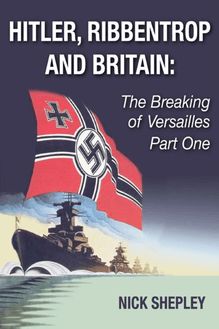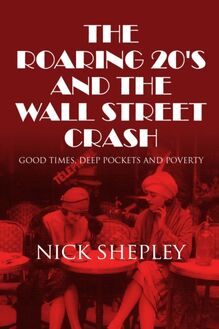-
 Univers
Univers
-
 Ebooks
Ebooks
-
 Livres audio
Livres audio
-
 Presse
Presse
-
 Podcasts
Podcasts
-
 BD
BD
-
 Documents
Documents
-
- Cours
- Révisions
- Ressources pédagogiques
- Sciences de l’éducation
- Manuels scolaires
- Langues
- Travaux de classe
- Annales de BEP
- Etudes supérieures
- Maternelle et primaire
- Fiches de lecture
- Orientation scolaire
- Méthodologie
- Corrigés de devoir
- Annales d’examens et concours
- Annales du bac
- Annales du brevet
- Rapports de stage
La lecture à portée de main
Vous pourrez modifier la taille du texte de cet ouvrage
Découvre YouScribe en t'inscrivant gratuitement
Je m'inscrisDécouvre YouScribe en t'inscrivant gratuitement
Je m'inscrisEn savoir plus
Vous pourrez modifier la taille du texte de cet ouvrage
En savoir plus

Description
Sujets
Informations
| Publié par | Andrews UK |
| Date de parution | 07 décembre 2015 |
| Nombre de lectures | 0 |
| EAN13 | 9781782345831 |
| Langue | English |
Informations légales : prix de location à la page 0,0150€. Cette information est donnée uniquement à titre indicatif conformément à la législation en vigueur.
Extrait
Title Page
RED SUN RISING
Japan, China and the West 1894-1941
By
Nick Shepley
Publisher Information
Red Sun Rising published in 2012 by
Andrews UK Limited
www.andrewsuk.com
This book is sold subject to the condition that it shall not, by way of trade or otherwise, be lent, resold, hired out or otherwise circulated without the publisher’s prior written consent in any form of binding or cover other than that in which it is published, and without a similar condition being imposed on the subsequent purchaser.
Copyright © 2013 Nick Shepley
The right of Nick Shepley to be identified as author of this book has been asserted in accordance with section 77 and 78 of the Copyrights Designs and Patents Act 1988.
Overview
When the Russian fleet was swiftly destroyed by the Japanese at Tsushima in May 1905, a shockwave reverberated throughout the world. Not only had Russia been defeated and humiliated, but Western imperialism, with all it’s grandiose assumptions of European superiority, had been dealt a bloody nose. Astute European and American commentators looked on in a mixture of awe, surprise and fear, suddenly understanding that a modernising warrior nation had defied Euro-centric assumptions and established itself as a major world power. The colonial subjects of Britain, France and other European nations also paid close attention to defeat, noting the ease with which a supposedly invincible and notionally western great power had been defeated. It signified a fundamental and long term shift in the balance of power in Asia, and began Japan’s rise to globalism, one that would only be finally ended with the dropping of atomic bombs on Hiroshima and Nagasaki.
This is the first of several books about Japan and her relations with the rest of Asia and the Western World in the 20 th Century. This ebook follows the rise of Japan to global power status, a rise than surprised, then worried the West.
This is also an attempt to understand how China became, after 1900, perhaps the most contested region in the world, and how Japan came to see China as rightfully belonging to her.
It is these conflicts and crises that pave a very long road to Japan’s doomed Pacific War, a war that begins with this ebook’s sequel, Red Sun At War.
Introduction: A Day Of Infamy
The mood was sombre, but there was a tension in the air, a sort of electrified charge that manifests itself prior to the breaking of an almighty storm. The President, Franklin Delano Roosevelt, crippled by polio but standing before Congress, using specially designed leg braces to stand articulated the shock and the anger of the American people.
“Yesterday, Dec. 7, 1941 - a date which will live in infamy - the United States of America was suddenly and deliberately attacked by naval and air forces of the Empire of Japan.
The United States was at peace with that nation and, at the solicitation of Japan, was still in conversation with the government and its emperor looking toward the maintenance of peace in the Pacific.”
He went on to paint a far bigger picture, revealing to the American people the scale of Japan’s ambitions.
“Yesterday, the Japanese government also launched an attack against Malaya. Last night, Japanese forces attacked Hong Kong. Last night, Japanese forces attacked Guam. Last night, Japanese forces attacked the Philippine Islands. Last night, the Japanese attacked Wake Island. This morning, the Japanese attacked Midway Island.
Japan has, therefore, undertaken a surprise offensive extending throughout the Pacific area. The facts of yesterday speak for themselves. The people of the United States have already formed their opinions and well understand the implications to the very life and safety of our nation. As commander in chief of the Army and Navy, I have directed that all measures be taken for our defense. Always will we remember the character of the onslaught against us.”
The facts were sobering, but to Roosevelt surely they were unsurprising; shocking maybe, but to some degree inevitable. In this ebook we’re going to examine how, for the second time in a generation, a supposedly isolationist power wound up fighting a world war, especially given the fact that America had re-elected Roosevelt on a platform of non intervention in 1940. As with most popularly held notions on the importance of events, the attack itself is perhaps not even half the story. To understand the motivations for America’s entry into the Second World War we need to look at her foreign policy during the previous decade and her long term predictions about how the world might look in the decades to come. The simplistic notion that America existed in blissful ignorance of world affairs until her peace was rudely interrupted by Japan needs to be revised, as with 1917, America did not suddenly declare war, but witnessed a gradual drift towards war, with Pearl Harbour a final tipping point, after which a war policy not only existed but became an unstoppable expression of national will. Roosevelt had long seen war as an inevitability, and since his famous Arsenal Of Democracy speech in December 1940, he had been strongly suggesting to the American public that the USA would be better to fight for democracy before it w extinguished in Europe and elsewhere altogether.
Americans had a right to feel confused by the growing chaos in Europe during the 1930s, the horrors of World War One, a war to end wars, had seemingly solved nothing. all that appeared to have emerged was a brief hiatus, likely to be interrupted at some point in the future, and as the 1930s progressed, the likelihood grew ever greater. Each power left the negotiating tables at Paris having learned lessons from both the war and the peace. In particular Japan walked away, determined not to allow a repetition of the treatment meted out to her by Britain, France and America, and she was not without justification for feeling aggrieved. She had been an active part of the alliance against Germany during World War One and was treated at Versailles like a second rate power, an obscure Oriental backwater who could be easily bullied and humiliated. It was remarkably short sighted and demonstrated a remarkably short Western memory, some 14 years before, Japan had stunned the world and dispelled any comfortable Western notions that she was a second rate power by sinking the Russian fleets at Port Arthur and Tsushima. The shockwaves that these two epic naval victories sent around the world were profound, for the first time in centuries an Asian power had got the better of a European one, and the surprise attacks of the Russo Japanese War in 1904-5 would become powerful historical precedents for the Japanese Navy to follow some three and a half decades later.
Part One
Port Arthur: The First Pearl Harbour
The Sino-Japanese War
In the late 19 th Century, as Russia found imperial expansion in the West and on her Southern borders increasingly difficult, she turned her attentions to the East. It became harder and harder to grow into Islamic Central Asia as the century drew to a close, British India remained a long standing goal for many Russian strategists, but the reality of the situation was that the British, using mountain ranges and deserts to their advantage, played the ‘Great Game’ with Russia rather too well. As Russia’s position in the Balkans weakened and Germany favoured her Austrian rivals, it became clear to Russia that if she wanted to expand at all it loud have to be at the expense of the Chinese in the East.
China by the 1890s was being eyed hungrily by Western imperial powers. The British above all had the biggest presence in China, in Hong Kong and Shanghai, and had established favourable trading rights there after defeating China in the Opium Wars. Africa, now almost completely divided between British, French, Belgian, German and Portuguese colonists was crowded and dangerous. Further imperial expansion into Africa was likely to set off a colonial war, so imperial land grabs needed to be done in a region under less pressure. China had been in a state of decline for several centuries and the Qing Dynasty that ruled China was entering its last days. Before the Russians demanded their concessions from the ailing empire, the Japanese had already taught the Chinese a salutary lesson in the nature of modern warfare between 1894 and 1895. The First Sino-Japanese war was fought over the issue of Korea, a country that Japan saw as being vital to her interests, Japan thought Korea was a strategic asset if it could be controlled and a liability if not, it was colonial space for surplus population and a source of resources, but it was also a back door into Japan if it couldn’t be controlled. Korea was to Japan what Ireland was to Britain in the 19 th Century, a door that swung both ways.
The crushing of the Chinese in the six month war was a signal to the rest of the world that the ailing power was ripe for dismemberment. Japan’s Meiji restoration, the return of centralised imperial power within the nation, has allowed for a great leap forward in science, engineering and above all military technology. Western ideas on warfare were imported to Japan and it was these principals that triumphed over the backward and hopelessly outdated Chinese.
The spoils to Japan were immense, Korea was given independence from Chinese rule but in reality came under Japanese control, Taiwan, which had been seized by Japan, was ceded to the Japanese as well. Japanese ships were given access to the Yangtze, which in trading terms was a huge economic concession; it was also a concession that ate away at centuries of insular Chinese xenophobia, the idea of foreigners traversing the kingdom as they saw fit was a serious dent to national pride and prest
-
 Univers
Univers
-
 Ebooks
Ebooks
-
 Livres audio
Livres audio
-
 Presse
Presse
-
 Podcasts
Podcasts
-
 BD
BD
-
 Documents
Documents
-
Jeunesse
-
Littérature
-
Ressources professionnelles
-
Santé et bien-être
-
Savoirs
-
Education
-
Loisirs et hobbies
-
Art, musique et cinéma
-
Actualité et débat de société
-
Jeunesse
-
Littérature
-
Ressources professionnelles
-
Santé et bien-être
-
Savoirs
-
Education
-
Loisirs et hobbies
-
Art, musique et cinéma
-
Actualité et débat de société
-
Actualités
-
Lifestyle
-
Presse jeunesse
-
Presse professionnelle
-
Pratique
-
Presse sportive
-
Presse internationale
-
Culture & Médias
-
Action et Aventures
-
Science-fiction et Fantasy
-
Société
-
Jeunesse
-
Littérature
-
Ressources professionnelles
-
Santé et bien-être
-
Savoirs
-
Education
-
Loisirs et hobbies
-
Art, musique et cinéma
-
Actualité et débat de société
- Cours
- Révisions
- Ressources pédagogiques
- Sciences de l’éducation
- Manuels scolaires
- Langues
- Travaux de classe
- Annales de BEP
- Etudes supérieures
- Maternelle et primaire
- Fiches de lecture
- Orientation scolaire
- Méthodologie
- Corrigés de devoir
- Annales d’examens et concours
- Annales du bac
- Annales du brevet
- Rapports de stage




















